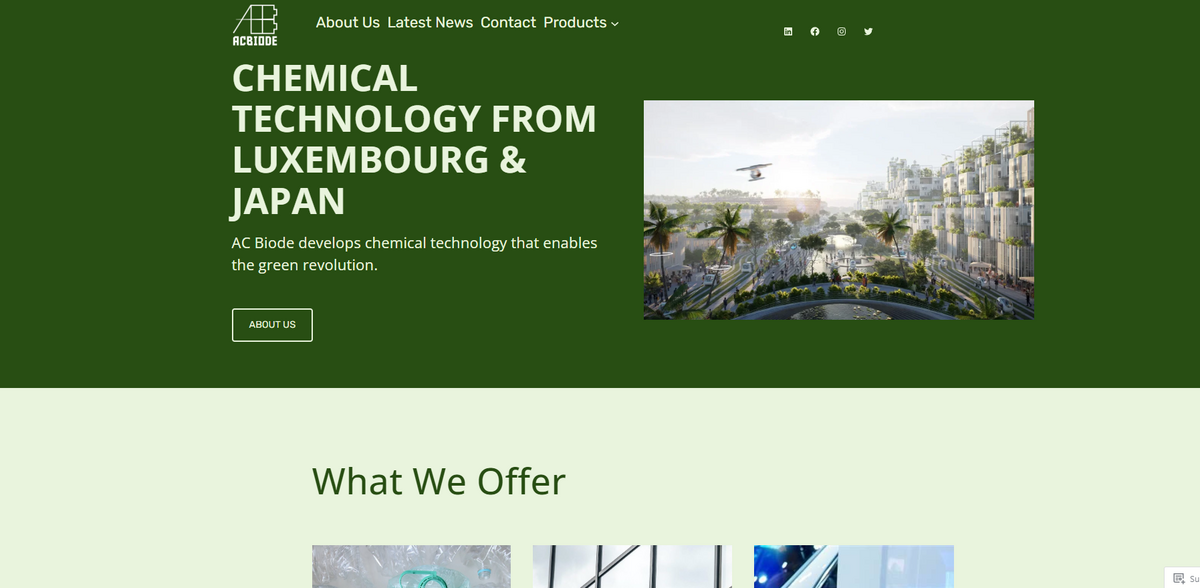AC Biode: Pioneering a Green Revolution with Chemical Technology
AC Biode develops chemical technology that enables the green revolution. The company drives innovation through multiple projects including PLASTALYST, RECO GLASS, AC BATTERY SYSTEM, PYROLYST, MICRO DROPLETS, and FLUORINE-FREE. These initiatives focus on repurposing wastes such as plastic, CO2 emissions, and even harmful ash from power plants, offering sustainable alternatives to traditional recycling methods. The projects embrace not only recycling but also upcycling of materials, with an unmistakable drive to transform hazardous waste into invaluable resources. This transformation is achieved by leveraging unique catalysts and chemical composites that operate at low temperatures and under innovative conditions… truly a breakthrough in modern green technology.
Key Benefits and Essential Facts
- PLASTALYST: Chemical catalysts to depolymerize plastic waste at low temperatures.
- RECO GLASS: Harnesses the power to capture CO2 through air filters and transform it into glass.
- AC BATTERY SYSTEM: Develops AC batteries and circuits intended for mobility and energy storage solutions.
- PYROLYST: Employs efficient catalytic pyrolysis that converts plastic waste into oil as a valuable feedstock.
- MICRO DROPLETS: Innovates with micro particle synthesis by forming droplets from different materials.
- FLUORINE-FREE: Creates water and oil repellent materials that are free from Fluorine (PFAS free).
Chemical Recycling and Innovation in Waste Management
The transformative approach is centered on chemical recycling. Projects such as PLASTALYST and PYROLYST showcase advanced methods to break down mixed waste plastics and organic waste into valuable resources. This method not only tackles the escalating issue of waste management but does so by introducing remarkable efficiency that is both cutting-edge and environmentally friendly. With catalysts operable at low temperatures, the process reduces energy consumption while ensuring that hazardous wastes are converted into substances like oil, which then serves as feedstock for further industrial applications. It is an effort that encapsulates innovation and sustainability all at once, a blend that is both intriguing and promising.
Sustainable Glass and Energy Storage Solutions
Moving beyond plastics, the RECO GLASS project stands out by capturing CO2 through specialized air filters and turning it into glass. This initiative offers a dual benefit: reducing carbon emissions while producing valuable construction material. At the same time, the AC BATTERY SYSTEM brings forward AC batteries and circuits that promise enhanced mobility and efficient energy storage. This balance of environmental responsibility and technological advancement fuels a circular economy that benefits communities on multiple levels. It is a refreshing take on turning environmental challenges into robust, market-ready products that have the power to reshape traditional industries.
Advanced Material Innovations and Environmental Impact
MICRO DROPLETS, another intriguing project, delves into the realm of micro particle synthesis by forming droplets from various materials. Meanwhile, FLUORINE-FREE technology puts the focus on developing water and oil repellent materials that are completely free of harmful fluorine compounds. This is particularly significant as PFAS have long been a concern in environmental management, so creating alternatives is a real game changer. The innovative processes at AC Biode extend the boundaries of conventional recycling methods and open new avenues for material repurposing without compromising on performance or safety, making the entire approach even more appealing to a diverse range of industries.
Harnessing Novel Technologies for a Circular Economy
The projects tackled by AC Biode speak to a larger vision for a circular economy—a system where waste is not an end-of-life byproduct but a resource with untapped value. The company’s pilot project with DaikyoNishikawa under the Hiroshima Open Accelerator, for example, utilized a precious-metal-free catalyst to pilot chemical recycling for Japanese automotive parts. Recognition at the NIKKEI THE PITCH GROWTH competition further highlights the groundbreaking technology at work in the laboratory. Here, converting mixed waste plastics and organic waste into resources like hydrogen not only furthers technological excellence but also underscores the practical, scalable applications that are essential for modern sustainable industry.
Project Impact and Alignment with Global SDGs
- SDG 7: Affordable and Clean Energy – Through innovations like the AC BATTERY SYSTEM.
- SDG 9: Industry, Innovation, and Infrastructure – Demonstrated by pioneering catalytic processes in recycling.
- SDG 11: Sustainable Cities and Communities – Via projects such as RECO GLASS that contribute to urban sustainability.
- SDG 12: Responsible Consumption and Production – By repurposing waste plastic and hazardous ash into useful products.
- SDG 13: Climate Action – With initiatives aimed at capturing CO2 and minimizing pollutants.
Turning Ashes into Opportunity and a New Frontier in Recycling
AC Biode not only spearheads the chemical transformation of plastics and CO2 but also upcycles coal ash, biomass ash, and even sewer sludge ash into multi-functional chemical composites such as absorbents. Ash generated from power plants often leads to significant air pollution and is routinely destined for landfills as harmful waste—a challenge that costs millions of USD per plant each year for disposal. Until now, the common recycling pathway for such ash was limited to its use in asphalt or concrete. AC Biode, however, is the only supplier in the world to recycle this ash into multi-functional chemical composites that serve a wide range of applications. The repurposed ash finds use in filters, masks, absorbents for oil spills, soil improvement materials, cosmetics, beauty products, water treatment solutions, and more. Already, two successful projects in Japan and Asia stand as testimony to this unique capability, marking a revolutionary step in the pursuit of sustainable development… clearly demonstrating that innovative recycling can create tangible, beneficial outcomes for society and the environment alike.


















